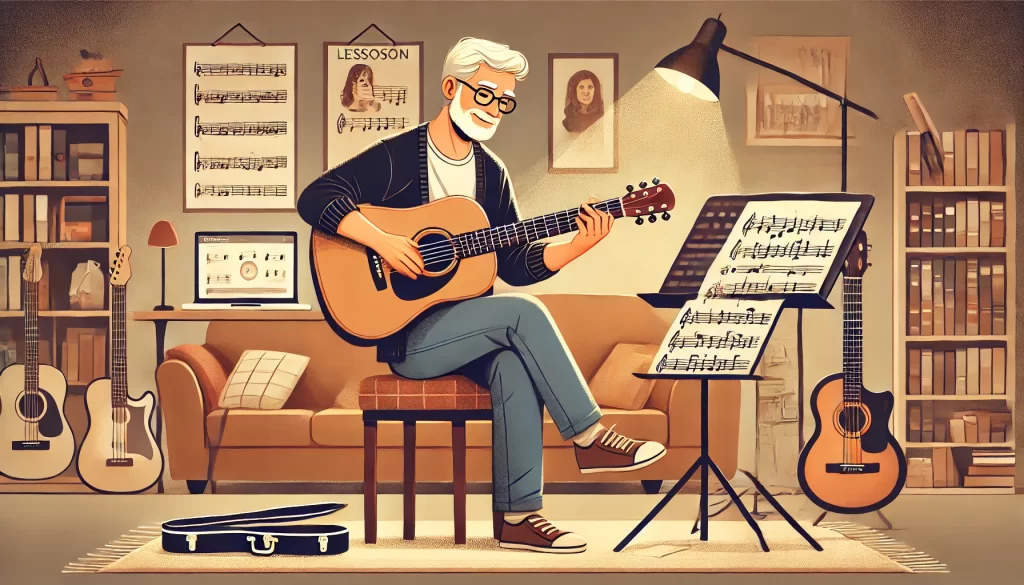Learning a musical instrument as an adult can be one of the most fulfilling endeavors you embark on. While many people assume that picking up a new instrument is something best done in childhood, adults are fully capable of mastering music with the right approach. In fact, learning music later in life offers unique advantages, such as greater patience, discipline, and a deeper appreciation for the art. This guide will explore the best techniques for learning a musical instrument as an adult, ensuring that you not only make progress but enjoy every step of the journey.
Table of Contents
1. Set Clear, Achievable Goals
One of the best techniques for learning a musical instrument as an adult is to set specific and achievable goals. Unlike children, adults often have limited time and competing priorities, making it essential to have a clear roadmap. Start by asking yourself what you want to achieve: Do you want to play a favorite song, perform at an event, or simply enjoy the process? Breaking down your long-term goals into smaller, manageable steps can help you stay focused and motivated.
For example, if your goal is to learn guitar, you might aim to master basic chords in the first month, practice strumming patterns in the second month, and eventually learn a simple song by the third. Setting small, realistic goals makes the learning process more enjoyable and prevents the frustration that often comes with unrealistic expectations.
2. Find the Right Teacher or Learning Resource
In today’s digital age, finding a good teacher has never been easier. One of the best techniques for learning a musical instrument as an adult is to seek guidance from someone experienced, whether through in-person lessons or online resources. While there are many self-teaching methods available, having a skilled instructor can accelerate your progress by providing structured lessons and immediate feedback.
Online platforms like YouTube, Udemy, and Skillshare also offer numerous tutorials, so if private lessons aren’t an option, you can still find excellent resources to help you on your journey. Additionally, there are music apps like Yousician or Simply Piano that provide interactive lessons tailored to your pace and skill level.
3. Practice Consistently, Even if in Short Sessions
When discussing the best techniques for learning a musical instrument as an adult, consistent practice is key. While you may not have hours to dedicate to your instrument every day, even 20-30 minutes of focused practice can make a significant difference over time. The key is consistency. Rather than practicing for long periods once a week, aim for shorter, more frequent sessions. This approach helps build muscle memory and improves your ability to retain new skills.
To make the most of your practice sessions, focus on specific elements like scales, chords, or finger exercises rather than trying to cover everything at once. Over time, these small improvements add up, leading to noticeable progress.
4. Use Technology to Your Advantage
One of the great advantages of learning a musical instrument as an adult is the wealth of technology available to aid your learning. There are apps for everything from tuning your instrument to providing backing tracks, metronomes, and sheet music. Many of these tools are either free or very affordable, making them accessible to all levels of learners.
For example, an app like “Chordify” can help you find chords to your favorite songs, while “Soundbrenner” provides a metronome to help you practice rhythm. Incorporating technology into your practice sessions is one of the best techniques for learning a musical instrument as an adult, as it keeps the experience engaging and interactive.
5. Join a Community of Learners
Playing music is often a social activity, and one of the best techniques for learning a musical instrument as an adult is to connect with others who share your passion. Whether it’s through online forums, local music groups, or even attending concerts, surrounding yourself with like-minded individuals can keep you motivated and inspired.
Many adults find that joining a group class or ensemble allows them to practice in a fun, low-pressure environment. Not only does this enhance your learning, but it also provides an opportunity to make new friends who share similar interests.
6. Be Patient and Enjoy the Process
Learning any new skill as an adult requires patience, and music is no different. One of the best techniques for learning a musical instrument as an adult is to embrace the journey rather than focusing solely on the end result. Progress might be slower than you’d like, but that’s perfectly normal. The key is to stay positive and remember why you started in the first place.
Adults often put pressure on themselves to achieve quick results, but music is about enjoying the process. Celebrate small wins, like mastering a new scale or playing a simple melody without mistakes. Over time, these small victories will compound into major progress.
7. Utilize Visualization and Mental Practice
While physical practice is crucial, another of the best techniques for learning a musical instrument as an adult is mental rehearsal. Visualization involves mentally going through the motions of playing a piece or practicing a difficult technique without actually touching your instrument. Research shows that mental practice can be nearly as effective as physical practice because it helps solidify your understanding and recall of the music.
If you’re unable to practice physically every day, take a few minutes to visualize yourself playing. This can help reinforce the muscle memory you’ve been working on and keep the music fresh in your mind.
8. Embrace Mistakes and Keep Experimenting
Mistakes are an inevitable part of the learning process, and one of the best techniques for learning a musical instrument as an adult is to view them as opportunities for growth. Every mistake you make is a chance to learn something new and refine your skills. Instead of getting discouraged, use mistakes as a way to understand what you need to improve.
Adults often fear making mistakes because of perfectionism, but in music, experimentation is key. Try new techniques, explore different genres, and don’t be afraid to sound imperfect along the way.
9. Track Your Progress
One of the best ways to stay motivated when learning a musical instrument as an adult is to track your progress. This could be through video recordings, keeping a practice journal, or simply noting down the pieces or techniques you’ve mastered. Watching your growth over time can be incredibly rewarding and helps to reinforce the notion that you’re making progress, even when it feels slow.
Conclusion
Learning a musical instrument as an adult is entirely possible with the right mindset and techniques. By setting achievable goals, practicing consistently, using technology, and embracing the learning process, you can make significant progress and enjoy the journey. Remember that the best techniques for learning a musical instrument as an adult are rooted in patience, consistency, and a love for music. With dedication and the right approach, you’ll soon be playing the music you love.

